中考总复习中的代词复习课件
图片预览

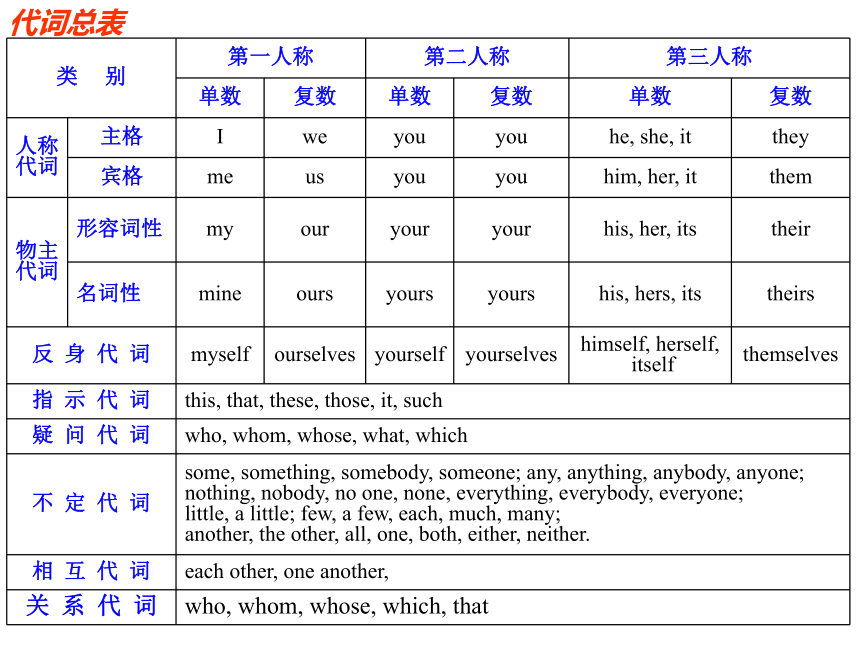
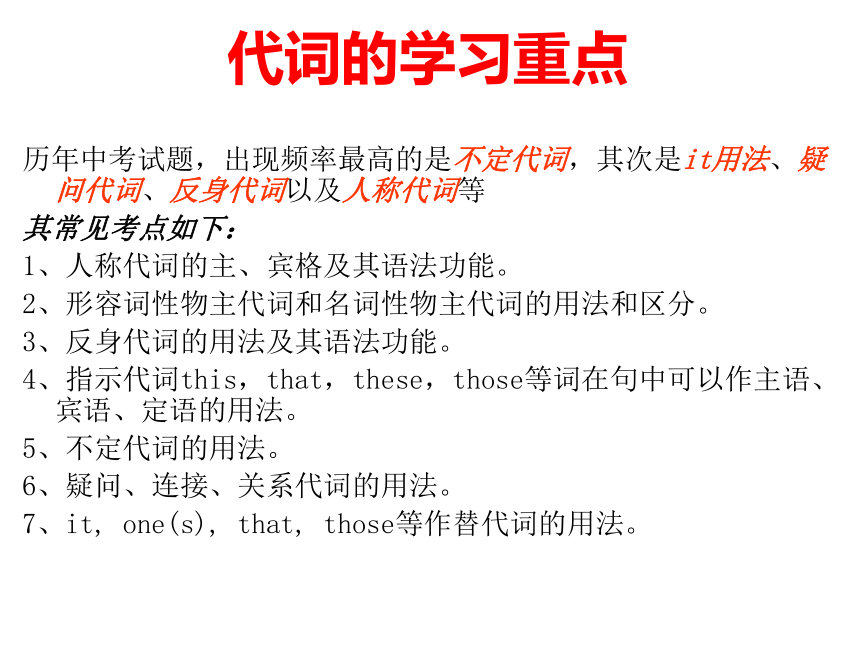
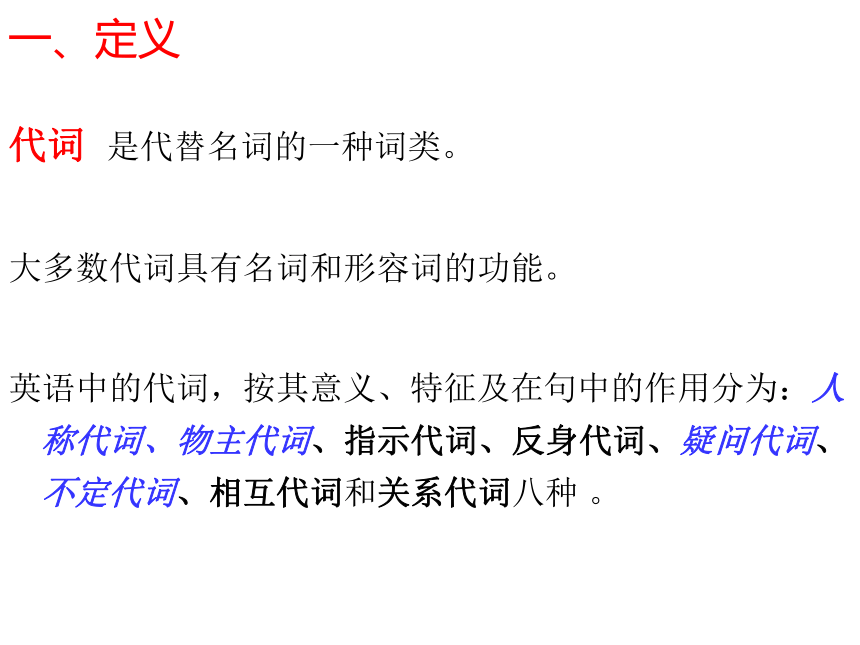
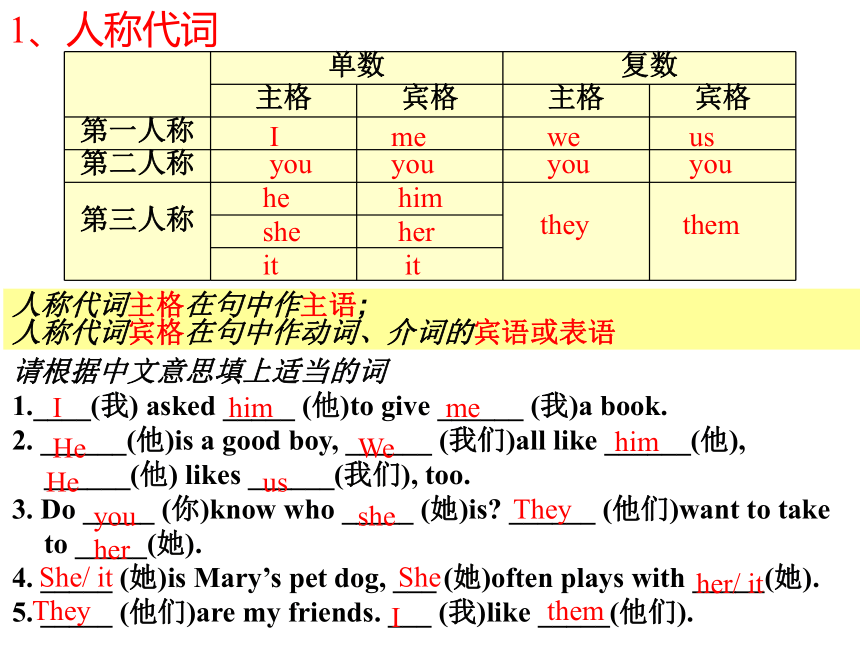

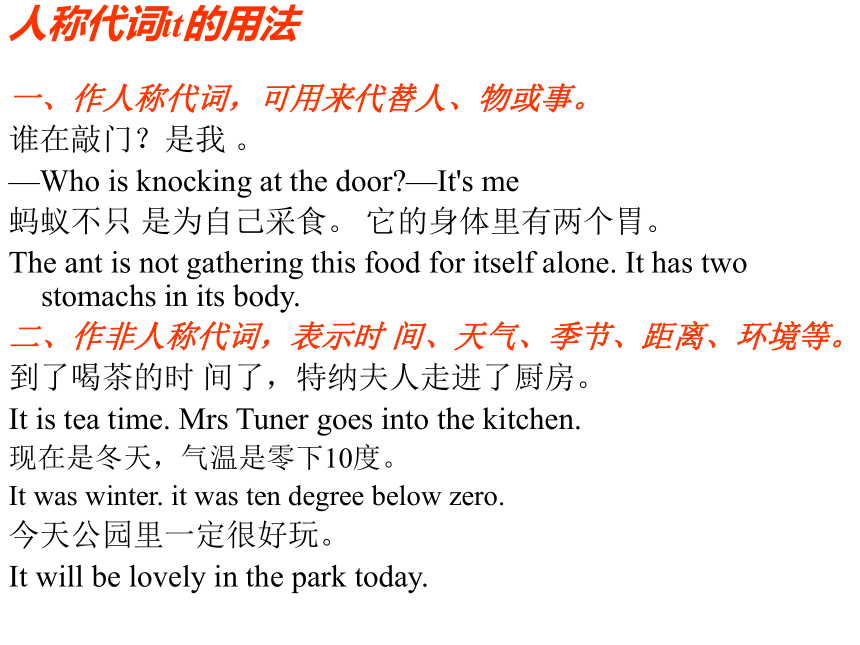
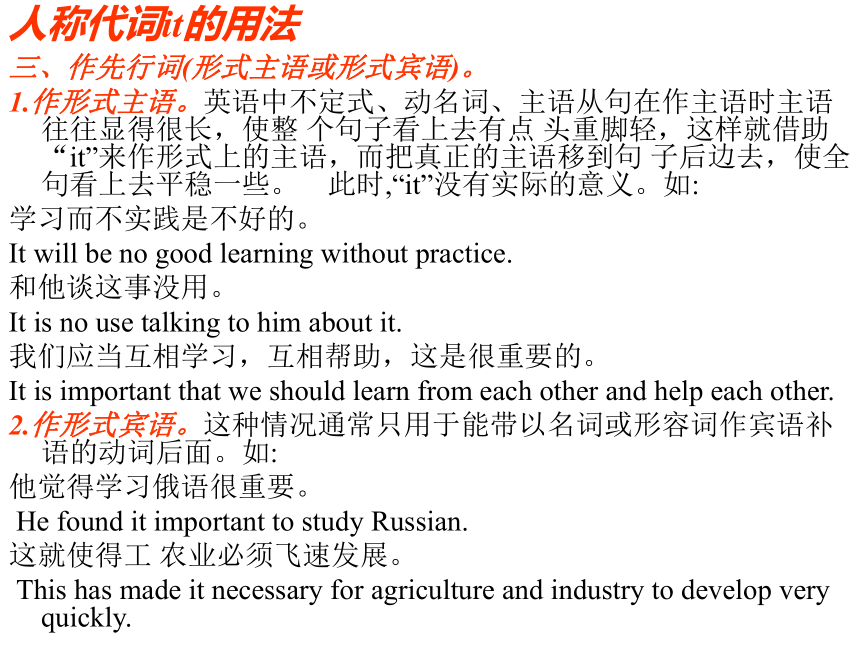
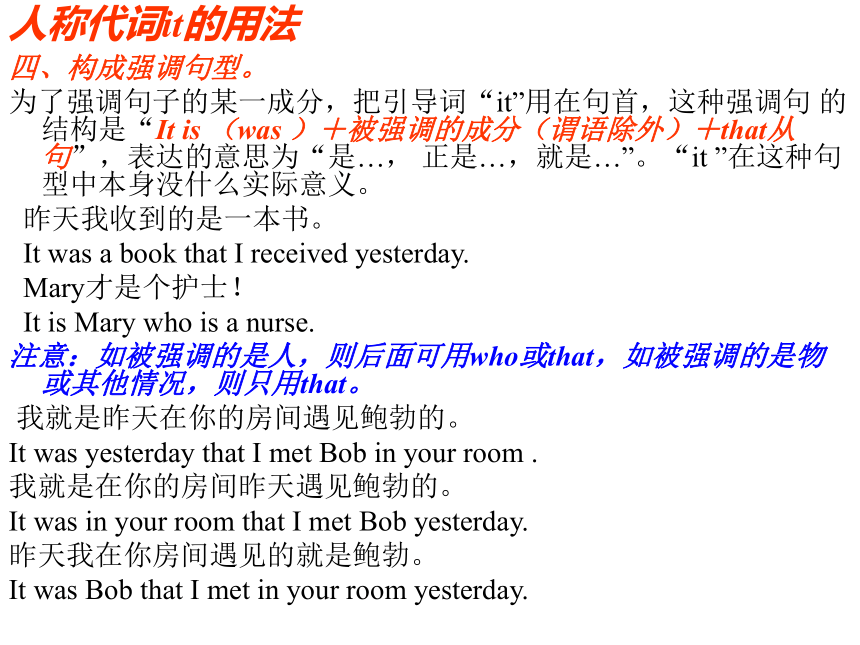
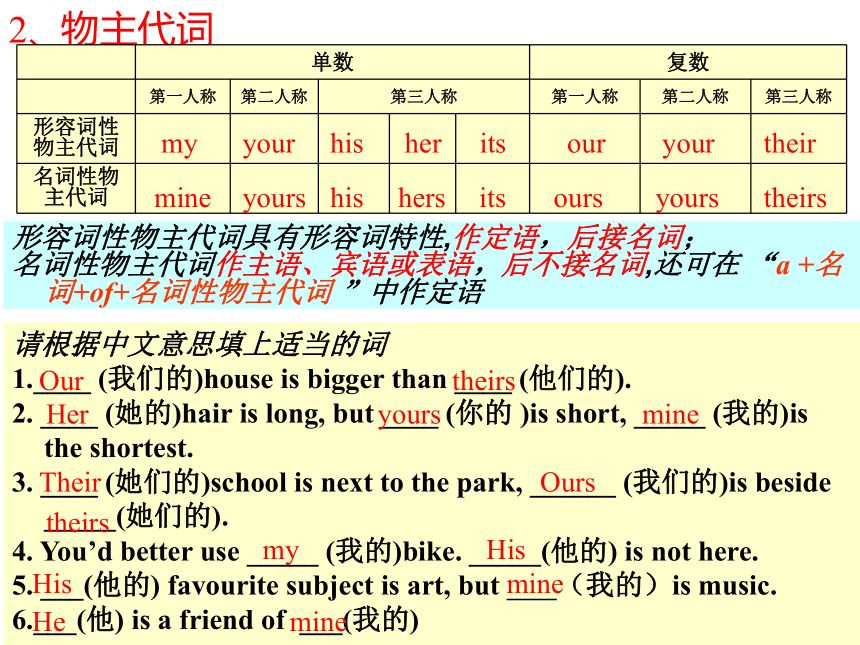
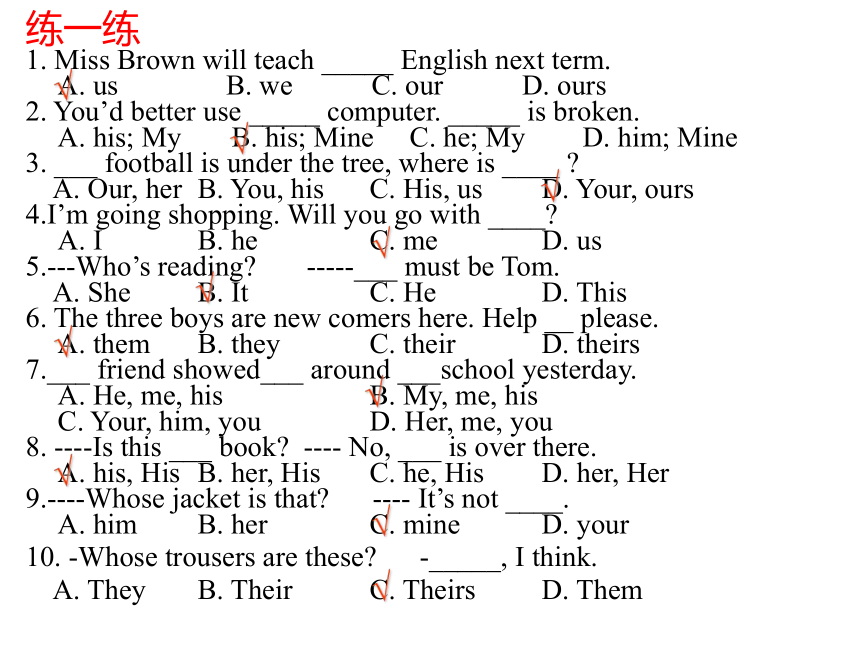
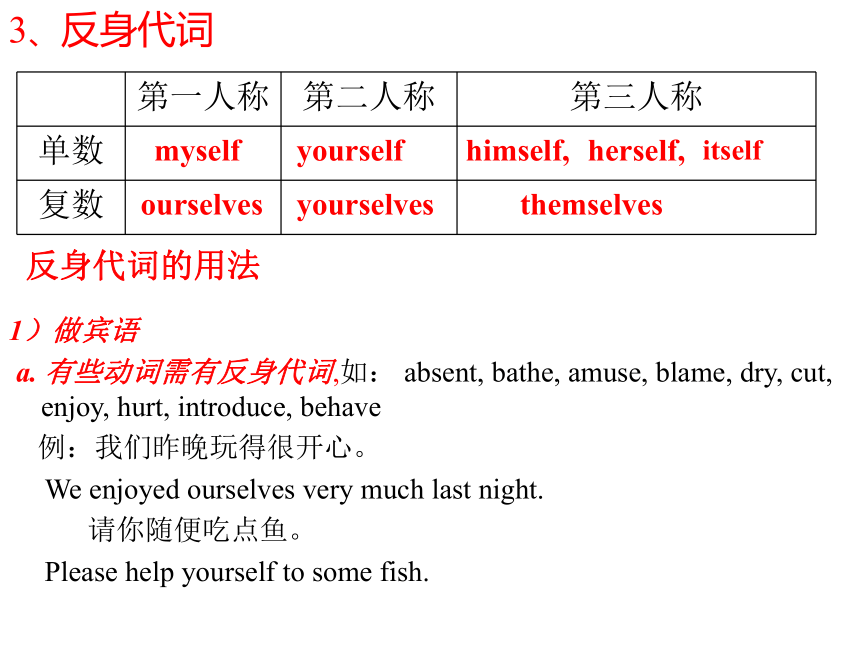
文档简介
课件41张PPT。中考总复习之代词积极思考造成积极人生 消极思考造成消极人生 二O一O年三月
欧阳葛制作 于广东河源南开实验学校代词总表历年中考试题,出现频率最高的是不定代词,其次是it用法、疑问代词、反身代词以及人称代词等
其常见考点如下:
1、人称代词的主、宾格及其语法功能。
2、形容词性物主代词和名词性物主代词的用法和区分。
3、反身代词的用法及其语法功能。
4、指示代词this,that,these,those等词在句中可以作主语、宾语、定语的用法。
5、不定代词的用法。
6、疑问、连接、关系代词的用法。
7、it, one(s), that, those等作替代词的用法。??? 代词的学习重点代词 是代替名词的一种词类。
大多数代词具有名词和形容词的功能。
英语中的代词,按其意义、特征及在句中的作用分为:人称代词、物主代词、指示代词、反身代词、疑问代词、不定代词、相互代词和关系代词八种 。
一、定义请根据中文意思填上适当的词
1.____(我) asked _____ (他)to give ______ (我)a book.
2. ______(他)is a good boy, ______ (我们)all like ______(他), ______(他) likes ______(我们), too.
3. Do _____ (你)know who _____ (她)is? ______ (他们)want to take to _____(她).
4. _____ (她)is Mary’s pet dog, ___ (她)often plays with _____(她).
5. _____ (他们)are my friends. ___ (我)like _____(他们).1、人称代词IhimmeHeWehimHeusyousheTheyherShe/ ither/ itSheTheyIthemImeweusyouyouyouyouhehimsheheritittheythem人称代词主格在句中作主语;
人称代词宾格在句中作动词、介词的宾语或表语注意:1.在并列的主语中,人称代词的顺序为:
单数231,复数123,若是做错事,I在最前面。
例:我、你、他今天打扫教室。
You, he and I clean the classroom today.
我们、你们、他们都喜欢音乐。
We, you and they all enjoy music.
谁打破了窗户? Mike和我。
Who broke the window? I and Mike did.
2.she可以用来代表国家、船只、大地、月亮等。
例:这辆车出了什么故障?她发动不起来了。
What’s wrong with the car? She won’t start.
今晚的月亮很圆,是吧?
The moon is round tonight, isn’t she?
3.在“It be +强调部分+that从句”中,人称代词主格可作表语。
例:是她告诉了我有关情况。
It is she that told me about it. 口诀:一、作人称代词,可用来代替人、物或事。
谁在敲门?是我 。
—Who is knocking at the door?—It's me
蚂蚁不只 是为自己采食。 它的身体里有两个胃。
The ant is not gathering this food for itself alone. It has two stomachs in its body.
二、作非人称代词,表示时 间、天气、季节、距离、环境等。
到了喝茶的时 间了,特纳夫人走进了厨房。
It is tea time. Mrs Tuner goes into the kitchen.
现在是冬天,气温是零下10度。
It was winter. it was ten degree below zero.
今天公园里一定很好玩。
It will be lovely in the park today.人称代词it的用法三、作先行词(形式主语或形式宾语)。
1.作形式主语。英语中不定式、动名词、主语从句在作主语时主语往往显得很长,使整 个句子看上去有点 头重脚轻,这样就借助“it”来作形式上的主语,而把真正的主语移到句 子后边去,使全句看上去平稳一些。 此时,“it”没有实际的意义。如:
学习而不实践是不好的。
It will be no good learning without practice.
和他谈这事没用。
It is no use talking to him about it.
我们应当互相学习,互相帮助,这是很重要的。
It is important that we should learn from each other and help each other.
2.作形式宾语。这种情况通常只用于能带以名词或形容词作宾语补语的动词后面。如:
他觉得学习俄语很重要。
He found it important to study Russian.
这就使得工 农业必须飞速发展。
This has made it necessary for agriculture and industry to develop very quickly.人称代词it的用法四、构成强调句型。
为了强调句子的某一成分,把引导词“it”用在句首,这种强调句 的结构是“It is (was )+被强调的成分(谓语除外)+that从句”,表达的意思为“是…, 正是…,就是…”。“it ”在这种句型中本身没什么实际意义。
昨天我收到的是一本书。
It was a book that I received yesterday.
Mary才是个护士!
It is Mary who is a nurse.
注意:如被强调的是人,则后面可用who或that,如被强调的是物或其他情况,则只用that。
我就是昨天在你的房间遇见鲍勃的。
It was yesterday that I met Bob in your room .
我就是在你的房间昨天遇见鲍勃的。
It was in your room that I met Bob yesterday.
昨天我在你房间遇见的就是鲍勃。
It was Bob that I met in your room yesterday. 人称代词it的用法2、物主代词请根据中文意思填上适当的词
1.____ (我们的)house is bigger than ____ (他们的).
2. ____ (她的)hair is long, but ____ (你的 )is short, _____ (我的)is the shortest.
3. ____ (她们的)school is next to the park, ______ (我们的)is beside _____(她们的).
4. You’d better use _____ (我的)bike. _____(他的) is not here.
5. ___(他的) favourite subject is art, but??????? (我的)is music.
6.___(他) is a friend of ___(我的)形容词性物主代词具有形容词特性,作定语,后接名词;
名词性物主代词作主语、宾语或表语,后不接名词,还可在 “a +名词+of+名词性物主代词 ”中作定语OurtheirsHeryoursmineTheirOurstheirsmyHisHisminemymineyouryoursourtheirhishisherhersitsitsoursyouryourstheirsHemine1. Miss Brown will teach _____ English next term. A. us??????????? B. we?????????? C. our?????????? D. ours
2. You’d better use _____ computer. _____ is broken. A. his; My?????? B. his; Mine???? C. he; My??????? D. him; Mine
3. ___ football is under the tree, where is ____ ?
A. Our, her B. You, his C. His, us D. Your, ours
4.I’m going shopping. Will you go with ____?
A. I B. he C. me D. us
5.---Who’s reading? -----___ must be Tom.
A. She B. It C. He D. This
6. The three boys are new comers here. Help __ please.
A. them B. they C. their D. theirs
7.___ friend showed___ around ___school yesterday.
A. He, me, his B. My, me, his
C. Your, him, you D. Her, me, you
8. ----Is this ___ book? ---- No, ___ is over there.
A. his, His B. her, His C. he, His D. her, Her
9.----Whose jacket is that? ---- It’s not ____.
A. him B. her C. mine D. your
10. -Whose trousers are these?????? -_____, I think.
A. They? B. Their?? C. Theirs?? D. Them? 练一练√√√√√√√√√√3、反身代词myselfourselvesyourselfyourselveshimself,herself,itselfthemselves反身代词的用法1)做宾语
a. 有些动词需有反身代词,如: absent, bathe, amuse, blame, dry, cut, enjoy, hurt, introduce, behave
例:我们昨晚玩得很开心。
We enjoyed ourselves very much last night.
请你随便吃点鱼。
Please help yourself to some fish.b. 用于及物动词+宾语+介词,如:take pride in, be annoyed with, help oneself to sth.
例:那个时候我不能打扮我自己
I could not dress (myself) up at that time.
所有的人都玩得很好。
All of them enjoyed themselves.
注:有些动词后不跟反身代词,get up, sit-down, stand up, wake up等。
如: Please sit down. 请坐。
2)作表语 反身代词有时用于 be, feel, seem, look 等后作表语,表示身体或精神处于正常。
如:你今天好像不太好。
You don’t seem yourself today.
3) 用于构成习语
for oneself 给(为)自己,独自 to oneself 对自己
say to oneself 心里想 talk / speak to oneself 自言自语
come to oneself 苏醒过来 absent oneself 缺席
beside oneself 失常,若狂 by oneself 独自地,单独地
of oneself 独自,自发地 teach oneself 自学4) 在不强调的情况下,but, except, for 等介词后宾语用反身代词或人称代词宾格均可。
如:除了我自己没人受伤。
No one but myself (me) is hurt.
注意:
a. 反身代词本身不能单独作主语。
如:我自己开车。
Myself drove the car.
I myself drove the car.
b. 但在and, or, nor连接的并列主语中,第二个主语可用反身代词,特别是myself 作主语。
如: Charles和我亲自看到的
Charles and myself saw it.
5)第二人称作宾语,要用反身代词。
如:你应为自己感到骄傲。
You should be proud of yourself.(错)(对)练一练一、用适当的代词填空。
1.The old man lives by ______.
2.I am sure I can do it all by _______.
3.Mary is old enough to take care of ______.
4.It is perfume, I made it by __________.
5.Can you carry this box upstairs by _______.
6.Did they enjoy__________ at the party yesterday?二、写出下列代词的反身代词 三、写出下列反身代词的人称代词 himselfmyselfherselfmyselfyourselfthemselvesmyselfherselfitselfoneselfyourself/ yourselveswe, usyouthey, themhe, himit定义:是用来指示或标识人或事物的代词。
指示代词分为 this, that, these, those; it, one, such等
1)指示代词分单数(this / that)和复数(these / those)两种形式,既可作限定词又可做代词,例如
单数 复数
限定词:This girl is Mary. Those men are my teachers.
代词: This is Mary. Those are my teachers.
2) 指示代词的句法功能;
a. 作主语
这事儿就该这样做。
b. 作宾语
我喜欢这个甚于那个。
c. 作主语补语
我的观点就是如此。
d. 作介词宾语
我并未拒绝那个。
那并不可怕。4、指示代词This is the way to do it. I like this better than that. My point is this. I don’t say no to that. There is no fear of that. 3)易错说明
1:指示代词在作主语时可指物也可指人,但作其他句子成分时只能指物,不能指人,例如:
那是我的老师。
他要和这个姑娘结婚。
我买这个。
2:That和those可作定语从句的先行词,但this和 these不能,同时,在作先行词时,只有those可指人,试比较:
他赞赏外表漂亮的东西
他赞赏那些外表漂亮的人。
他赞赏跳舞好的人。
他赞赏那些外表漂亮的东西。That is my teacher. ( that作主语,指人) He is going to marry this girl. (this作限定词)(错,this作宾语时不能指人)I bought this. (对, this指物,可作宾语)He admired that which looked beautiful.He admired those who looked beautiful. (those指人)He admired those who danced well. (those指人) He admired that who danced well.(错that作宾语时不能指人)He admired those which looked beautiful. (those指物) He is going to marry this.3:one,that 和it的区别:
one表示泛指,that和it 表示特指。
one 泛指同类中的任意一个;that特指同类中的一个,但不是同一个,而it 特指与所指名词的同一个。
我找不到我的帽子了。我想我该去买一顶。
你买的那顶帽子比我买的大。
我找不到我的帽子。我不知道我把它放在哪了。I can‘t find my hat. I think I must buy one. (泛指任意一个)The hat you bought is bigger than that I bought. (同类但不同个)I can't find my hat. I don' t know where I put it. ( 同一物)定义:疑问代词是用来构成特殊疑问句的代词。
who常用作主语和表语, whom作宾语, whose, what, which可用作主语、表语、宾语或定语。
eg. What happened?
Who is that man?
Whom are you waiting for?
What time is it by your watch?5、疑问代词whowhomwhosewhatwhosewhichwhose疑问代词的形式:疑问代词还可以用来引导主语从句、表语从句和宾语从句,所以又可称为连接代词。说明1:无论是做疑问代词还是限定词,which 和 what 所指的范围不同。what所指的范围是无限的,而which则指在一定的范围内,例如
你喜欢哪几部电影?
你喜欢什么样的电影?说明2:Whom是who的宾格,在书面语中,它作动词宾语或介词宾语,在口语中作宾语时,可用who代替,但在介词后只能用whom, 例如:
你在街上遇到了谁?
你要把这书带给谁?
你在校园里和谁讲话了?
Which films do you like best?What films do you like best? Who(m) did you meet on the street? (作动词宾语)Who(m) are you taking the book to? (作介词宾语,置句首)To whom did you speak on the campus? (置介词后作宾语,不能用who取代)说明3:疑问代词用于对介词宾语提问时,过去的文体中介词和疑问代词通常一起放在句首,现代英语中,疑问代词在句首,介词在句未,例如:
大部分人生活和工作的目的是什么?
你在找什么?
说明4:疑问代词还可引导名词性从句,例如:
我不知道他用意何在。
你能告诉我床上的蓝衬衣是谁的吗?
你说的我大部分同意,但并不完全赞同。
For what do most people live and work? (旧文体)What are you looking for?(现代英语)I can't make out what he is driving at.Can you tell me whose is the blue shirt on the bed?Much of what you say I agree with, but I cannot go all the way with you.练一把连线:(Match)
1. What’s on the chair??????? There is a book in the bag.
2. How is your father????????? These are apples.
3. What are these???????????? I go to school by bus.
4. What is in the bag???????? The radio is on the chair.
5. How do you go to school??? He is fine.
6. How much is it?????????? I wash my face in the morning.
7. What time is it????????????? I have two hands.
8. When do you wash your face? It is four o’clock.
9. How many hands do you have?? It is 5 RMB(人民币).
10.When do you have lunch????????? I have lunch at noon.435128976101.Why do you think to be with her?
A. can he stand B. he can stand C. that he can stand D. that he will stand
2.──There's a police car in front of our neighbour's house.
──What do you suppose ?
A. has happened B. has been happened C. has occured D. has been taken place
3.How long did she say here?
A. to stay B. she would stay C. would she stay D.she will stay
4.Where do you imagine the gold ring?
A. Alice has put B. Alice had put C. has Alice put D. that Alice has put
5.How long they carried out the experiment?
A.you can sure be B.can you be sure C.you can be sure D.can you sure be
6.Who do you think Tibet?
A.will leave to B.will leave for C.he will leave to D.that will leave for
7.Who will attend the important meeting?
A.do you know B.do you think C.you think D.he thinks
8.Where did they suggest during the summer holidays?
A.shall we go B.should we go C.we should go D.we will go 再练一把√√√√√√√√6、不定代词不定代词:不是指明代替任何特定名词或形容词的代词叫做不定代词。 定义形式部分不定代词的用法示例:1. both 全部,都
不定代词both指两个人或事物。可以用作主语、宾语、定语或同位语。
例如:
Both would like to go swimming.(作主语)
We invited both to come to our farm.(作宾语)
Both films are interesting.(作定语)
They both like skating.(作they的同位语) 2. none 无人或无物
不定代词none的含义和all相反,和no one,not any同义,但其用法相当于名词,在句子中一般作主语或宾语。它代替不可数名词作主语时,谓语动词用单数形式;代替可数名词作主语时,谓语动词用单、复数皆可。
例如
None of the problems is/are easy to solve. (作主语,代替可数名词)
None of the money is mine. (作主语,代替不可数名词)
I know none of them.(作宾语)
注:1.不定代词none表示"三个或三个以上都不......",所以汉语的"我们(三人以上)都不去"译为"None of us will go ."而不能译成"All of us will not go.“("我们并不是个个都去。" )
2. None与no one的用法区别为:
Who is in the room?
How many students are there in the room?
no one(没有人)常用来回答who的提问,
none(一个也没有)常用来回答how many的提问。 No one.None.特别注意3. either 两者之中的任何一个
不定代词either可以作主语、宾语和定语。
例如
Either of them will agree to this arrangement.(作主语
Here are two books. You can borrow either of them.(作宾语)
I believe either method will work. (作定语) 4. neither 两个之中一个也不是
不定代词neither是either的否定形式,可以作主语、宾语和定语。
例如
Neither is interesting. (作主语)
-Did you see Mary and Jack?
-No, I saw neither of them.(作宾语)
I think neither book is worth reading.(作定语)
注:a. 不定代词neither表示“两个都不”,所以汉语的“我俩都没去那儿”译成英语为“Neither of us went there.”而不能译成 “Both of us did not go there.“(”我俩没都去那儿”。)
b. 肯定形式的动词+neither=否定形式的动词+either。
例如: I like neither of them.=I don’t like either of them. 5. other 其他的,另外的
不定代词other相当于名词或形容词,可以在句中作主语、宾语、定语等。相当于名词时,有复数形式 others,还有所有格形式 other’s 和others’。不定代词 other之前常用冠词 the。
例如:
He has two daughters . One is a teacher, the other is a nurse.(作主语)
Some will go swimming, others will go shopping.(作主语)
I have two pictures of the Great Wall here. You have seen one. Now I’ll show you the other .(作宾语)
There are other ways of helping him out of difficulty.(作定语) 6. another 另一个,又一个
another是由an和other合并构成,因此,它只能代替或修饰可数的单数名词,前面不再用冠词。在句中可以作主语、宾语、表语和定语。
例如:
One is blind, another is deaf, and a third is lame.(作主语)
This shirt is too small for me. Please show me another . (作宾语)
She is a fool, and her husband is another.(作表语)
Would you like another cup of milk? (作定语)
You will have to stay here for another five days.(作定语,five days形式上是复数,但意义上是单数,可以和another连用) 7. one
1)不定代词one指不定人称,表示人,译为“人”,“一个人”等。它有反身代词oneself和所有格形式one‘s。
2)不定代词one也可以用来代替前面出现过的可数名词,以免重复。它有复数形式ones,可以与冠词连用,可以有自己的定语。
不定代词one可以在句中作主语或宾语;one’s只能作定语。
例如:
One has to do one’s best.(one 作主语,one's作定语。)
Please give me the book, the one on the desk. (one作宾语)复合不定代词的语法特点复合不定代词包括 something, somebody, someone, anything, anybody, anyone, nothing, nobody, no one, everything, everybody, everyone 等。
它们在句中可用作主语、宾语或表语,但不能用作定语。 使用时注意以下几点:1. something, someone 等和 anything, anyone等的区别与 some 和 any 的区别一样,前者一般用于肯定句,后者一般用于否定句、疑问句或条件句。
2. 不定代词的定语要后置。
如:Is there anything important in today’s newspaper? 今天的报纸上有什么重要新闻吗?3. 复合不定代词受定语修饰时,定语应放在它们后面。
例如:
Tell us something interesting. 给我们讲点有趣的事。
4. 指人的复合不定代词若用作主语,其谓语动词一般用单数,相应的人称代词和物主代词也用单数 he, him, his (不一定指男性)。但在非正式文体中常用复数代词 they, them, their。
例如:
Everyone knows this, doesn’t he [don’t they]? 人人都知道这一点,不是吗?5. 反意疑问句在确定主语时,常被列为考点。
当主语为表示人的复合不定代词时,疑问部分的主语常用they(有时也用he);
当主语为表物的复合不定代词时,疑问部分的主语通常为it。
例:
1.Nobody wants to waste time watching boring plays,____? A. does it B. do they C. is he D. are they
2.I am sure everything goes well,____? A. doesn’t it B. does they
C. doesn't everything D. aren’t I√√6.部分否定是高考常考考点之一
常表达为:not+全部肯定词或全部肯定词+not,其意义为“并非都,不都”。前者为基本概念,通常,学生有一定的掌握;但后者与一般否定句相似,易引起学生判断上的失误,也是作者出题,命题的焦点。
如: All of us will not go我们并不是个个都去。
例:
1.I agree with most of what you said, but I don't agree with____. A. everything B. anything C. something D. nothing
2.—The exam was difficult, wasn't it? —No,but I don't think____ could pass it. A. somebody B. anybody C. nobody D. everybody √√7.复合不定代词常见短语
1. have something to do with 与……有关
2. something like 几分像,大约
3. something of 在某种意义(程度)上
4. anything but 除…外任何,根本不…
5. anything like 像那样的事,全然不
6. anything of 一点儿,一点…味儿
7. have nothing to do with 与…无关,和…不往来
8. be nothing to 对…无足轻重,不能与…相比
9. to say nothing of 更不必说
10. for nothing 免费,徒然,没有理由
11. all to nothing 百分之百的
12. nothing but 除…以外什么也不,只有 8、复合不定代词在谚语中应用
1.Everybody’s business is nobody’s business. 人人都管等于没人管。
2.Everybody’s friend is everybody’s fool. 每人的朋友是每人的傻瓜。
3.Everything is good for something. 凡物都有用。
4.Everything has two sides. 事物都有两个方面。
5.The man who is everything is nothing. 什么都是的人什么都不是。
6.He who has no conscience has nothing. 没有良心的人一无所有。
7.Nothing succeeds like success. 一事成功,事事顺利。
8.Nothing venture, nothing have. 不入虎穴,焉得虎子。
9.Money isn’t everything.金钱不是万能的。
10.To know everything is to know nothing. 样样皆通,样样稀松。
11.Everything is good when new, but friends when old.东西是新的好,朋友是老的好。不定代词练习
⑴: 用someone/ somebody, anyone / anybody, no one / nobody,something, anything, nothing, none填空。
1._________ who feels tired should wear energetic colours.
2.There is ________ in the fitting room(试衣间).
3.Who is in the classroom? -___________.
4.________ is knocking at the door.
5.I looked for it everywhere, but I found _______ in the end.
6.Would you like ________ to eat?
7.Did they have _________ important to tell you?
8.How many eggs were there in the basket? There was __________.AnybodynothingNo oneSomeonenothingsomethinganythingnone中考真题
1.-How long will you stay here?(06 武汉)
-I think I will be here for??????? more days.
A. few B. a few C. little D. a little
2. -Is this your son’s sweater? (07 重庆)
-No. _______ is on the chair behind the desk.
A. He???????? B. Him???????? C. She???????? D. His
3. Kate is a kind girl.??????? often helps us learn English.(06 海淀)
A. I?????????? B. You????????? C. She???????? D. We
4.?????? of them knows French, so I have to ask a third person for help.(2006 南通)
A. Neither B. Either C. Both D. None
5. I can’t find the pen I was given. Have you seen _______??(06 徐州)
A. it?????????? B. one????????? C. this?????????? D. that
6. Who teaches _______________(they) physics?(06 徐州)
7. We should learn how to look after o??_________??? .???(06 安徽) ☆☆☆☆☆themurselves练兵场
词形转换
(A)根据句意和首字母,完成下列句子。
1. Here are two dictionaries. You can only take e?? ???? of them.
2.-I’d like s??? ??? to drink.
-A??? ??? else? What about s?? ??? to eat?
-Er, n??? ??? else, thanks.
3. The exercise is too difficult. N?? ???? can do it.
4. This shirt is a little shorter. Please show me a???? ?? one.
5. Help y??? ??? to some fish, Lingling and Fangfang!itheromethingnythingomethingothingobodynotherourselvesBye-bye
欧阳葛制作 于广东河源南开实验学校代词总表历年中考试题,出现频率最高的是不定代词,其次是it用法、疑问代词、反身代词以及人称代词等
其常见考点如下:
1、人称代词的主、宾格及其语法功能。
2、形容词性物主代词和名词性物主代词的用法和区分。
3、反身代词的用法及其语法功能。
4、指示代词this,that,these,those等词在句中可以作主语、宾语、定语的用法。
5、不定代词的用法。
6、疑问、连接、关系代词的用法。
7、it, one(s), that, those等作替代词的用法。??? 代词的学习重点代词 是代替名词的一种词类。
大多数代词具有名词和形容词的功能。
英语中的代词,按其意义、特征及在句中的作用分为:人称代词、物主代词、指示代词、反身代词、疑问代词、不定代词、相互代词和关系代词八种 。
一、定义请根据中文意思填上适当的词
1.____(我) asked _____ (他)to give ______ (我)a book.
2. ______(他)is a good boy, ______ (我们)all like ______(他), ______(他) likes ______(我们), too.
3. Do _____ (你)know who _____ (她)is? ______ (他们)want to take to _____(她).
4. _____ (她)is Mary’s pet dog, ___ (她)often plays with _____(她).
5. _____ (他们)are my friends. ___ (我)like _____(他们).1、人称代词IhimmeHeWehimHeusyousheTheyherShe/ ither/ itSheTheyIthemImeweusyouyouyouyouhehimsheheritittheythem人称代词主格在句中作主语;
人称代词宾格在句中作动词、介词的宾语或表语注意:1.在并列的主语中,人称代词的顺序为:
单数231,复数123,若是做错事,I在最前面。
例:我、你、他今天打扫教室。
You, he and I clean the classroom today.
我们、你们、他们都喜欢音乐。
We, you and they all enjoy music.
谁打破了窗户? Mike和我。
Who broke the window? I and Mike did.
2.she可以用来代表国家、船只、大地、月亮等。
例:这辆车出了什么故障?她发动不起来了。
What’s wrong with the car? She won’t start.
今晚的月亮很圆,是吧?
The moon is round tonight, isn’t she?
3.在“It be +强调部分+that从句”中,人称代词主格可作表语。
例:是她告诉了我有关情况。
It is she that told me about it. 口诀:一、作人称代词,可用来代替人、物或事。
谁在敲门?是我 。
—Who is knocking at the door?—It's me
蚂蚁不只 是为自己采食。 它的身体里有两个胃。
The ant is not gathering this food for itself alone. It has two stomachs in its body.
二、作非人称代词,表示时 间、天气、季节、距离、环境等。
到了喝茶的时 间了,特纳夫人走进了厨房。
It is tea time. Mrs Tuner goes into the kitchen.
现在是冬天,气温是零下10度。
It was winter. it was ten degree below zero.
今天公园里一定很好玩。
It will be lovely in the park today.人称代词it的用法三、作先行词(形式主语或形式宾语)。
1.作形式主语。英语中不定式、动名词、主语从句在作主语时主语往往显得很长,使整 个句子看上去有点 头重脚轻,这样就借助“it”来作形式上的主语,而把真正的主语移到句 子后边去,使全句看上去平稳一些。 此时,“it”没有实际的意义。如:
学习而不实践是不好的。
It will be no good learning without practice.
和他谈这事没用。
It is no use talking to him about it.
我们应当互相学习,互相帮助,这是很重要的。
It is important that we should learn from each other and help each other.
2.作形式宾语。这种情况通常只用于能带以名词或形容词作宾语补语的动词后面。如:
他觉得学习俄语很重要。
He found it important to study Russian.
这就使得工 农业必须飞速发展。
This has made it necessary for agriculture and industry to develop very quickly.人称代词it的用法四、构成强调句型。
为了强调句子的某一成分,把引导词“it”用在句首,这种强调句 的结构是“It is (was )+被强调的成分(谓语除外)+that从句”,表达的意思为“是…, 正是…,就是…”。“it ”在这种句型中本身没什么实际意义。
昨天我收到的是一本书。
It was a book that I received yesterday.
Mary才是个护士!
It is Mary who is a nurse.
注意:如被强调的是人,则后面可用who或that,如被强调的是物或其他情况,则只用that。
我就是昨天在你的房间遇见鲍勃的。
It was yesterday that I met Bob in your room .
我就是在你的房间昨天遇见鲍勃的。
It was in your room that I met Bob yesterday.
昨天我在你房间遇见的就是鲍勃。
It was Bob that I met in your room yesterday. 人称代词it的用法2、物主代词请根据中文意思填上适当的词
1.____ (我们的)house is bigger than ____ (他们的).
2. ____ (她的)hair is long, but ____ (你的 )is short, _____ (我的)is the shortest.
3. ____ (她们的)school is next to the park, ______ (我们的)is beside _____(她们的).
4. You’d better use _____ (我的)bike. _____(他的) is not here.
5. ___(他的) favourite subject is art, but??????? (我的)is music.
6.___(他) is a friend of ___(我的)形容词性物主代词具有形容词特性,作定语,后接名词;
名词性物主代词作主语、宾语或表语,后不接名词,还可在 “a +名词+of+名词性物主代词 ”中作定语OurtheirsHeryoursmineTheirOurstheirsmyHisHisminemymineyouryoursourtheirhishisherhersitsitsoursyouryourstheirsHemine1. Miss Brown will teach _____ English next term. A. us??????????? B. we?????????? C. our?????????? D. ours
2. You’d better use _____ computer. _____ is broken. A. his; My?????? B. his; Mine???? C. he; My??????? D. him; Mine
3. ___ football is under the tree, where is ____ ?
A. Our, her B. You, his C. His, us D. Your, ours
4.I’m going shopping. Will you go with ____?
A. I B. he C. me D. us
5.---Who’s reading? -----___ must be Tom.
A. She B. It C. He D. This
6. The three boys are new comers here. Help __ please.
A. them B. they C. their D. theirs
7.___ friend showed___ around ___school yesterday.
A. He, me, his B. My, me, his
C. Your, him, you D. Her, me, you
8. ----Is this ___ book? ---- No, ___ is over there.
A. his, His B. her, His C. he, His D. her, Her
9.----Whose jacket is that? ---- It’s not ____.
A. him B. her C. mine D. your
10. -Whose trousers are these?????? -_____, I think.
A. They? B. Their?? C. Theirs?? D. Them? 练一练√√√√√√√√√√3、反身代词myselfourselvesyourselfyourselveshimself,herself,itselfthemselves反身代词的用法1)做宾语
a. 有些动词需有反身代词,如: absent, bathe, amuse, blame, dry, cut, enjoy, hurt, introduce, behave
例:我们昨晚玩得很开心。
We enjoyed ourselves very much last night.
请你随便吃点鱼。
Please help yourself to some fish.b. 用于及物动词+宾语+介词,如:take pride in, be annoyed with, help oneself to sth.
例:那个时候我不能打扮我自己
I could not dress (myself) up at that time.
所有的人都玩得很好。
All of them enjoyed themselves.
注:有些动词后不跟反身代词,get up, sit-down, stand up, wake up等。
如: Please sit down. 请坐。
2)作表语 反身代词有时用于 be, feel, seem, look 等后作表语,表示身体或精神处于正常。
如:你今天好像不太好。
You don’t seem yourself today.
3) 用于构成习语
for oneself 给(为)自己,独自 to oneself 对自己
say to oneself 心里想 talk / speak to oneself 自言自语
come to oneself 苏醒过来 absent oneself 缺席
beside oneself 失常,若狂 by oneself 独自地,单独地
of oneself 独自,自发地 teach oneself 自学4) 在不强调的情况下,but, except, for 等介词后宾语用反身代词或人称代词宾格均可。
如:除了我自己没人受伤。
No one but myself (me) is hurt.
注意:
a. 反身代词本身不能单独作主语。
如:我自己开车。
Myself drove the car.
I myself drove the car.
b. 但在and, or, nor连接的并列主语中,第二个主语可用反身代词,特别是myself 作主语。
如: Charles和我亲自看到的
Charles and myself saw it.
5)第二人称作宾语,要用反身代词。
如:你应为自己感到骄傲。
You should be proud of yourself.(错)(对)练一练一、用适当的代词填空。
1.The old man lives by ______.
2.I am sure I can do it all by _______.
3.Mary is old enough to take care of ______.
4.It is perfume, I made it by __________.
5.Can you carry this box upstairs by _______.
6.Did they enjoy__________ at the party yesterday?二、写出下列代词的反身代词 三、写出下列反身代词的人称代词 himselfmyselfherselfmyselfyourselfthemselvesmyselfherselfitselfoneselfyourself/ yourselveswe, usyouthey, themhe, himit定义:是用来指示或标识人或事物的代词。
指示代词分为 this, that, these, those; it, one, such等
1)指示代词分单数(this / that)和复数(these / those)两种形式,既可作限定词又可做代词,例如
单数 复数
限定词:This girl is Mary. Those men are my teachers.
代词: This is Mary. Those are my teachers.
2) 指示代词的句法功能;
a. 作主语
这事儿就该这样做。
b. 作宾语
我喜欢这个甚于那个。
c. 作主语补语
我的观点就是如此。
d. 作介词宾语
我并未拒绝那个。
那并不可怕。4、指示代词This is the way to do it. I like this better than that. My point is this. I don’t say no to that. There is no fear of that. 3)易错说明
1:指示代词在作主语时可指物也可指人,但作其他句子成分时只能指物,不能指人,例如:
那是我的老师。
他要和这个姑娘结婚。
我买这个。
2:That和those可作定语从句的先行词,但this和 these不能,同时,在作先行词时,只有those可指人,试比较:
他赞赏外表漂亮的东西
他赞赏那些外表漂亮的人。
他赞赏跳舞好的人。
他赞赏那些外表漂亮的东西。That is my teacher. ( that作主语,指人) He is going to marry this girl. (this作限定词)(错,this作宾语时不能指人)I bought this. (对, this指物,可作宾语)He admired that which looked beautiful.He admired those who looked beautiful. (those指人)He admired those who danced well. (those指人) He admired that who danced well.(错that作宾语时不能指人)He admired those which looked beautiful. (those指物) He is going to marry this.3:one,that 和it的区别:
one表示泛指,that和it 表示特指。
one 泛指同类中的任意一个;that特指同类中的一个,但不是同一个,而it 特指与所指名词的同一个。
我找不到我的帽子了。我想我该去买一顶。
你买的那顶帽子比我买的大。
我找不到我的帽子。我不知道我把它放在哪了。I can‘t find my hat. I think I must buy one. (泛指任意一个)The hat you bought is bigger than that I bought. (同类但不同个)I can't find my hat. I don' t know where I put it. ( 同一物)定义:疑问代词是用来构成特殊疑问句的代词。
who常用作主语和表语, whom作宾语, whose, what, which可用作主语、表语、宾语或定语。
eg. What happened?
Who is that man?
Whom are you waiting for?
What time is it by your watch?5、疑问代词whowhomwhosewhatwhosewhichwhose疑问代词的形式:疑问代词还可以用来引导主语从句、表语从句和宾语从句,所以又可称为连接代词。说明1:无论是做疑问代词还是限定词,which 和 what 所指的范围不同。what所指的范围是无限的,而which则指在一定的范围内,例如
你喜欢哪几部电影?
你喜欢什么样的电影?说明2:Whom是who的宾格,在书面语中,它作动词宾语或介词宾语,在口语中作宾语时,可用who代替,但在介词后只能用whom, 例如:
你在街上遇到了谁?
你要把这书带给谁?
你在校园里和谁讲话了?
Which films do you like best?What films do you like best? Who(m) did you meet on the street? (作动词宾语)Who(m) are you taking the book to? (作介词宾语,置句首)To whom did you speak on the campus? (置介词后作宾语,不能用who取代)说明3:疑问代词用于对介词宾语提问时,过去的文体中介词和疑问代词通常一起放在句首,现代英语中,疑问代词在句首,介词在句未,例如:
大部分人生活和工作的目的是什么?
你在找什么?
说明4:疑问代词还可引导名词性从句,例如:
我不知道他用意何在。
你能告诉我床上的蓝衬衣是谁的吗?
你说的我大部分同意,但并不完全赞同。
For what do most people live and work? (旧文体)What are you looking for?(现代英语)I can't make out what he is driving at.Can you tell me whose is the blue shirt on the bed?Much of what you say I agree with, but I cannot go all the way with you.练一把连线:(Match)
1. What’s on the chair??????? There is a book in the bag.
2. How is your father????????? These are apples.
3. What are these???????????? I go to school by bus.
4. What is in the bag???????? The radio is on the chair.
5. How do you go to school??? He is fine.
6. How much is it?????????? I wash my face in the morning.
7. What time is it????????????? I have two hands.
8. When do you wash your face? It is four o’clock.
9. How many hands do you have?? It is 5 RMB(人民币).
10.When do you have lunch????????? I have lunch at noon.435128976101.Why do you think to be with her?
A. can he stand B. he can stand C. that he can stand D. that he will stand
2.──There's a police car in front of our neighbour's house.
──What do you suppose ?
A. has happened B. has been happened C. has occured D. has been taken place
3.How long did she say here?
A. to stay B. she would stay C. would she stay D.she will stay
4.Where do you imagine the gold ring?
A. Alice has put B. Alice had put C. has Alice put D. that Alice has put
5.How long they carried out the experiment?
A.you can sure be B.can you be sure C.you can be sure D.can you sure be
6.Who do you think Tibet?
A.will leave to B.will leave for C.he will leave to D.that will leave for
7.Who will attend the important meeting?
A.do you know B.do you think C.you think D.he thinks
8.Where did they suggest during the summer holidays?
A.shall we go B.should we go C.we should go D.we will go 再练一把√√√√√√√√6、不定代词不定代词:不是指明代替任何特定名词或形容词的代词叫做不定代词。 定义形式部分不定代词的用法示例:1. both 全部,都
不定代词both指两个人或事物。可以用作主语、宾语、定语或同位语。
例如:
Both would like to go swimming.(作主语)
We invited both to come to our farm.(作宾语)
Both films are interesting.(作定语)
They both like skating.(作they的同位语) 2. none 无人或无物
不定代词none的含义和all相反,和no one,not any同义,但其用法相当于名词,在句子中一般作主语或宾语。它代替不可数名词作主语时,谓语动词用单数形式;代替可数名词作主语时,谓语动词用单、复数皆可。
例如
None of the problems is/are easy to solve. (作主语,代替可数名词)
None of the money is mine. (作主语,代替不可数名词)
I know none of them.(作宾语)
注:1.不定代词none表示"三个或三个以上都不......",所以汉语的"我们(三人以上)都不去"译为"None of us will go ."而不能译成"All of us will not go.“("我们并不是个个都去。" )
2. None与no one的用法区别为:
Who is in the room?
How many students are there in the room?
no one(没有人)常用来回答who的提问,
none(一个也没有)常用来回答how many的提问。 No one.None.特别注意3. either 两者之中的任何一个
不定代词either可以作主语、宾语和定语。
例如
Either of them will agree to this arrangement.(作主语
Here are two books. You can borrow either of them.(作宾语)
I believe either method will work. (作定语) 4. neither 两个之中一个也不是
不定代词neither是either的否定形式,可以作主语、宾语和定语。
例如
Neither is interesting. (作主语)
-Did you see Mary and Jack?
-No, I saw neither of them.(作宾语)
I think neither book is worth reading.(作定语)
注:a. 不定代词neither表示“两个都不”,所以汉语的“我俩都没去那儿”译成英语为“Neither of us went there.”而不能译成 “Both of us did not go there.“(”我俩没都去那儿”。)
b. 肯定形式的动词+neither=否定形式的动词+either。
例如: I like neither of them.=I don’t like either of them. 5. other 其他的,另外的
不定代词other相当于名词或形容词,可以在句中作主语、宾语、定语等。相当于名词时,有复数形式 others,还有所有格形式 other’s 和others’。不定代词 other之前常用冠词 the。
例如:
He has two daughters . One is a teacher, the other is a nurse.(作主语)
Some will go swimming, others will go shopping.(作主语)
I have two pictures of the Great Wall here. You have seen one. Now I’ll show you the other .(作宾语)
There are other ways of helping him out of difficulty.(作定语) 6. another 另一个,又一个
another是由an和other合并构成,因此,它只能代替或修饰可数的单数名词,前面不再用冠词。在句中可以作主语、宾语、表语和定语。
例如:
One is blind, another is deaf, and a third is lame.(作主语)
This shirt is too small for me. Please show me another . (作宾语)
She is a fool, and her husband is another.(作表语)
Would you like another cup of milk? (作定语)
You will have to stay here for another five days.(作定语,five days形式上是复数,但意义上是单数,可以和another连用) 7. one
1)不定代词one指不定人称,表示人,译为“人”,“一个人”等。它有反身代词oneself和所有格形式one‘s。
2)不定代词one也可以用来代替前面出现过的可数名词,以免重复。它有复数形式ones,可以与冠词连用,可以有自己的定语。
不定代词one可以在句中作主语或宾语;one’s只能作定语。
例如:
One has to do one’s best.(one 作主语,one's作定语。)
Please give me the book, the one on the desk. (one作宾语)复合不定代词的语法特点复合不定代词包括 something, somebody, someone, anything, anybody, anyone, nothing, nobody, no one, everything, everybody, everyone 等。
它们在句中可用作主语、宾语或表语,但不能用作定语。 使用时注意以下几点:1. something, someone 等和 anything, anyone等的区别与 some 和 any 的区别一样,前者一般用于肯定句,后者一般用于否定句、疑问句或条件句。
2. 不定代词的定语要后置。
如:Is there anything important in today’s newspaper? 今天的报纸上有什么重要新闻吗?3. 复合不定代词受定语修饰时,定语应放在它们后面。
例如:
Tell us something interesting. 给我们讲点有趣的事。
4. 指人的复合不定代词若用作主语,其谓语动词一般用单数,相应的人称代词和物主代词也用单数 he, him, his (不一定指男性)。但在非正式文体中常用复数代词 they, them, their。
例如:
Everyone knows this, doesn’t he [don’t they]? 人人都知道这一点,不是吗?5. 反意疑问句在确定主语时,常被列为考点。
当主语为表示人的复合不定代词时,疑问部分的主语常用they(有时也用he);
当主语为表物的复合不定代词时,疑问部分的主语通常为it。
例:
1.Nobody wants to waste time watching boring plays,____? A. does it B. do they C. is he D. are they
2.I am sure everything goes well,____? A. doesn’t it B. does they
C. doesn't everything D. aren’t I√√6.部分否定是高考常考考点之一
常表达为:not+全部肯定词或全部肯定词+not,其意义为“并非都,不都”。前者为基本概念,通常,学生有一定的掌握;但后者与一般否定句相似,易引起学生判断上的失误,也是作者出题,命题的焦点。
如: All of us will not go我们并不是个个都去。
例:
1.I agree with most of what you said, but I don't agree with____. A. everything B. anything C. something D. nothing
2.—The exam was difficult, wasn't it? —No,but I don't think____ could pass it. A. somebody B. anybody C. nobody D. everybody √√7.复合不定代词常见短语
1. have something to do with 与……有关
2. something like 几分像,大约
3. something of 在某种意义(程度)上
4. anything but 除…外任何,根本不…
5. anything like 像那样的事,全然不
6. anything of 一点儿,一点…味儿
7. have nothing to do with 与…无关,和…不往来
8. be nothing to 对…无足轻重,不能与…相比
9. to say nothing of 更不必说
10. for nothing 免费,徒然,没有理由
11. all to nothing 百分之百的
12. nothing but 除…以外什么也不,只有 8、复合不定代词在谚语中应用
1.Everybody’s business is nobody’s business. 人人都管等于没人管。
2.Everybody’s friend is everybody’s fool. 每人的朋友是每人的傻瓜。
3.Everything is good for something. 凡物都有用。
4.Everything has two sides. 事物都有两个方面。
5.The man who is everything is nothing. 什么都是的人什么都不是。
6.He who has no conscience has nothing. 没有良心的人一无所有。
7.Nothing succeeds like success. 一事成功,事事顺利。
8.Nothing venture, nothing have. 不入虎穴,焉得虎子。
9.Money isn’t everything.金钱不是万能的。
10.To know everything is to know nothing. 样样皆通,样样稀松。
11.Everything is good when new, but friends when old.东西是新的好,朋友是老的好。不定代词练习
⑴: 用someone/ somebody, anyone / anybody, no one / nobody,something, anything, nothing, none填空。
1._________ who feels tired should wear energetic colours.
2.There is ________ in the fitting room(试衣间).
3.Who is in the classroom? -___________.
4.________ is knocking at the door.
5.I looked for it everywhere, but I found _______ in the end.
6.Would you like ________ to eat?
7.Did they have _________ important to tell you?
8.How many eggs were there in the basket? There was __________.AnybodynothingNo oneSomeonenothingsomethinganythingnone中考真题
1.-How long will you stay here?(06 武汉)
-I think I will be here for??????? more days.
A. few B. a few C. little D. a little
2. -Is this your son’s sweater? (07 重庆)
-No. _______ is on the chair behind the desk.
A. He???????? B. Him???????? C. She???????? D. His
3. Kate is a kind girl.??????? often helps us learn English.(06 海淀)
A. I?????????? B. You????????? C. She???????? D. We
4.?????? of them knows French, so I have to ask a third person for help.(2006 南通)
A. Neither B. Either C. Both D. None
5. I can’t find the pen I was given. Have you seen _______??(06 徐州)
A. it?????????? B. one????????? C. this?????????? D. that
6. Who teaches _______________(they) physics?(06 徐州)
7. We should learn how to look after o??_________??? .???(06 安徽) ☆☆☆☆☆themurselves练兵场
词形转换
(A)根据句意和首字母,完成下列句子。
1. Here are two dictionaries. You can only take e?? ???? of them.
2.-I’d like s??? ??? to drink.
-A??? ??? else? What about s?? ??? to eat?
-Er, n??? ??? else, thanks.
3. The exercise is too difficult. N?? ???? can do it.
4. This shirt is a little shorter. Please show me a???? ?? one.
5. Help y??? ??? to some fish, Lingling and Fangfang!itheromethingnythingomethingothingobodynotherourselvesBye-bye
同课章节目录
- 词法
- 名词
- 动词和动词短语
- 动词语态
- 动词时态
- 助动词和情态动词
- 非谓语动词
- 冠词
- 代词
- 数词和量词
- 形容词副词及其比较等级
- 介词和介词短语
- 连词和感叹词
- 构词法
- 相似、相近词比较
- 句法
- 陈述句
- 一般疑问句和否定疑问句
- 特殊疑问句及选择疑问句
- 反意疑问句
- 存在句(There be句型)
- 宾语从句
- 定语从句
- 状语从句
- 主谓一致问题
- 简单句
- 并列句
- 复合句
- 主谓一致
- 主、表语从句
- 名词性从句
- 直接引语和间接引语
- 虚拟语气
- 感叹句
- 强调句
- 倒装句
- 祈使句
- 句子的成分
- 句子的分类
- 题型专区
- 单项选择部分
- 易错题
- 完形填空
- 阅读理解
- 词汇练习
- 听说训练
- 句型转换
- 补全对话
- 短文改错
- 翻译
- 书面表达
- 任务型阅读
- 语法填空
- 其他资料
